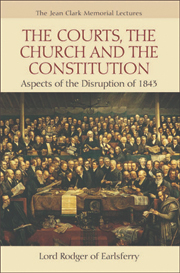Lecture 2 - A War and its Warriors
Published online by Cambridge University Press: 05 August 2013
Summary
‘Open war is now waged between the Church of Scotland and the courts of civil law in that country.’ A trifle wordy perhaps, and certainly not to be mistaken for a classic Sun headline, but it is nevertheless quite a dramatic opening. Not my own, I hasten to add, but the first words of a pamphlet published in 1841 in an attempt to explain the warfare engulfing the courts and the Established Church in Scotland to bewildered MPs and others in England. Though different in style, it bears some resemblance to a modern newspaper headline after the Government has lost a court case. Old style or new style, the media like to portray the courts as doing battle with the Government or some other powerful body such as the Church.
In some quarters the courts acquire a certain kudos from their supposed role in taking on the executive. In an era when the Whips leave little room for independent action by MPs, it is sometimes argued that the courts are the only effective opposition which can control an arrogant government. For instance, in a leading article in July 2006, The Independent said:
This expanded role for the judiciary is something we should welcome. Judges are becoming a greater influence in checking our elected rulers. As the executive grows increasingly powerful and careless with our civil liberties this can only be a good thing.
- Type
- Chapter
- Information
- The Courts, the Church and the ConstitutionAspects of the Disruption of 1843, pp. 56 - 90Publisher: Edinburgh University PressPrint publication year: 2008



